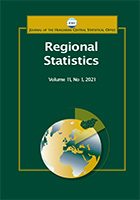Overtourism in Budapest: Analysis of spatial process and suggested solutions
Overtourism in Budapest: Analysis of spatial process and suggested solutions
Author(s): Bulcsú Remenyik, Attila Barcza, Janos Csapo, Barna Szabó, Gyula Fodor, Lóránt Dénes DávidSubject(s): Social Sciences, Economy, Geography, Regional studies
Published by: Központi Statisztikai Hivatal
Keywords: overtourism; spatial analysis; sustainability; shared transport; Airbnb
Summary/Abstract: The research aims to assess the extent of overtourism in Budapest. The analysis first introduces a system of criteria for a sustainable destination, highlighting the capacity network, institutional system, structural aspects, and architectural infrastructure load of a sustainable region. A survey of the relevant literature reveals the increasing scholarly attention paid to the phenomenon of overtourism, while singling out Budapest as one of the most affected urban areas. One potential explanation for Budapest’s situation is that it developed as a result of a decreasing ability of the central districts to absorb a growing visitor load, along with a decline in the seasonal distribution of tourism. The current situation could also have emerged because the respective negative consequences were not counteracted by the inclusion of local residents. The residential segments and inhabitants were not allocated a share in the tourism-related income and, despite the steady growth in visitor numbers, they were not consulted either. The in-depth interviews with the residents of Erzsébetváros confirm that the intensity of the irritation level indicated on the Irridex scale developed by Doxy can be divided into various stages with time.As part of the research, we surveyed 510 international visitors concerning tourism activities. An in-depth interview was carried out with Zoltán Somogyi, former Deputy Secretary General of the World Tourism Organization (UNWTO), about potential solutions to the problem of overtourism.Furthermore, the study proposes solutions to the problems related to overtourism and presents a survey of relevant recommendations by international organizations. To address overtourism, the capital requires quick decisions. Demand needs to be diversified; new sustainable tourism products need to be introduced. Visitors to Budapest should be extended in space and time, while the interest of domestic tourists in the city should be raised through strong marketing activities. Stricter regulations should be adopted for local entrepreneurs; more support should be given to contactless solutions (Jamal-Budke 2020). In the post-COVID-19 period, the overtourism is reduced and the search for close-to-nature experiences is replaced by creative tourism (Nagy et al. 2018).
Journal: Regional Statistics
- Issue Year: 11/2021
- Issue No: 03
- Page Range: 179-197
- Page Count: 19
- Language: English

